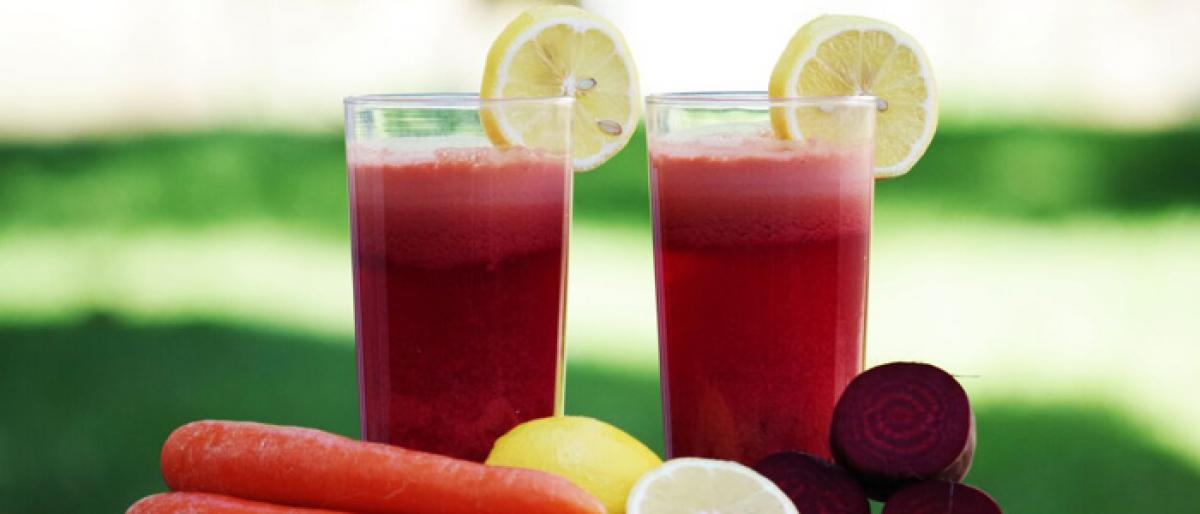Sail through scorching summer

When the temperatures rise, the body starts feeling increasingly uncomfortable as it is susceptible to discomforts such as heat strokes and diarrhoea. It is a fact that as the heat sizzles, the internal and external body demands cooling. What we must understand is that our nutritional needs change season to season.
When the temperatures rise, the body starts feeling increasingly uncomfortable as it is susceptible to discomforts such as heat strokes and diarrhoea. It is a fact that as the heat sizzles, the internal and external body demands cooling. What we must understand is that our nutritional needs change season to season.
We tend to feel weak in the summer as it causes major electrolyte loss, which one must replenish with foods that are high in water content, natural salt, and natural sugar. The Indian physicians in olden days categorised foods into heating and cooling foods. Unfortunately, our modern lifestyles don’t allow us to follow these principles thus leaving an imbalance in the body. So to make our body adjust to the summer heat we need to make a few dietary changes by simply eating what is naturally and locally available in the summer. Nutrition is the same for everyone whether you are working or at home. Air conditioners cool you but tend to dehydrate you faster than normal.
As the season starts, your water bottle should become your Siamese twin joint to your hip if you want to prevent dehydration. Start out the day with it and have it through the day as it cools down the body instantaneously. It is your basic transport medium for vitamins, minerals and nutrients in your body preventing fatigue. Curb your caffeine intake by switching to green or herbal teas.
The abundance of antioxidants will boost your energy daylong. A glass of lemon water with a dash of rock salt and roasted cumin powder will give you Vitamin C to strengthen the immune system and prevent heat strokes. Coconut water during summer days is a good idea as it is high in natural electrolytes and mineral content. Application on the body prevents prickly heat, summer boils and soothes rashes. Buttermilk with its yoghurt, mint, coriander, ginger, roasted cumin powder and rock salt mixed with water is the best Indian way to cool down. These friendly probiotic bacteria keep irritable bowel syndrome and diarrhoea away.
This is the time to savour some of the local water-based fruits that can be sweet or tangy. Everyone’s favourite Mango, be it ripe or raw, is rich in beta-carotene, Vitamin A and C, it contains zero fat, rich in natural sugars and fibres. It keeps you satiated for a longer time and prevents constipation too.
Look towards it to satisfy any sweet cravings. Bright red watermelons are delectable thirst-quenchers, which keep you cool even on the hottest days. Filled with antioxidants and negligible in calories a chilled watermelon is your perfect option. Palmyra (Ice Apple) with its cool and spongy jelly outside which is filled with water should be included for sure. Other fruits like tender coconut meat, black jamun, a tamarind fruit (Seema chintakaya) and gooseberries should be part of your daily fruits.
Make sure at lunch there is a salad of cucumbers, onions and tomatoes with a dash of lemon and rock salt. High in water content, they are refreshing and cooling. Accompany this with cooked vegetables from the gourd family followed by rice or whole wheat roti or bread. Avoid the millets as they are very heavy to digest. Vegetables in your daals and sambhars flavoured with tamarinds or garcinia cambogia with a light tempering of cumin, turmeric, ginger and chilli with roti and rice would be good dinner options.
Reduce non-vegetarian foods to the minimum. Avoid eggs, fried food, processed food, white flour, white sugar and creamy gravies. Eating according to the season will help you sail through the scorching summer.














